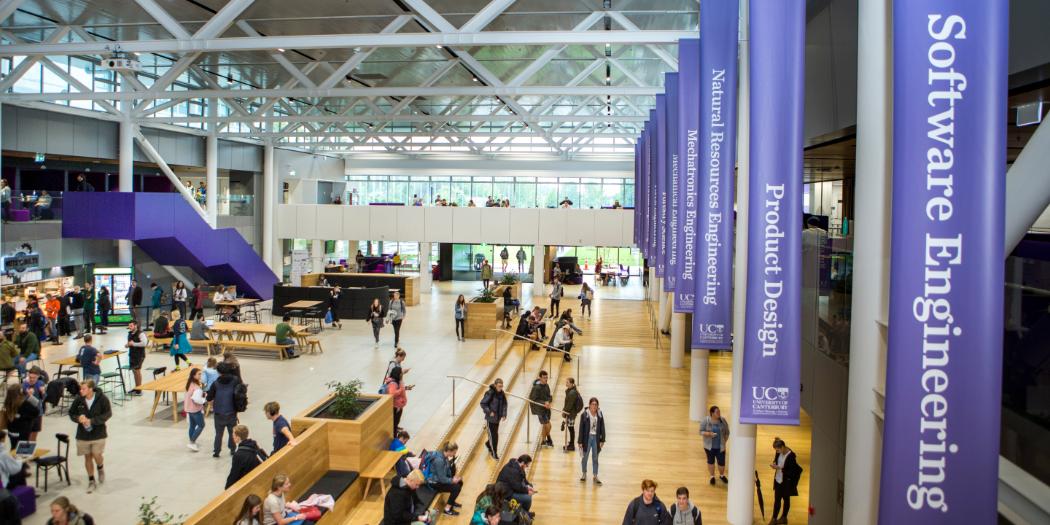Alternative Engineering First Year Options
Direct Entry and Modified Engineering First Year
If you have taken STAR MATH199: Advancing in Mathematical Sciences, or equivalent course(s) at another tertiary institution and you achieve excellent NCEA, IB, or CIE results in relevant subjects at a NZ high school, you may be considered for Direct Entry to the 2nd Year of the BE(Hons), or a modified Engineering first year with acceleration in mathmatics
If you have not taken STAR MATH199 and achieve excellent NCEA, IB, or CIE results in relevant subjects at a NZ high school, you may be eligible to apply for a Modified Engineering First Year.
To be considered for a Modified Engineering First Year, you should be expecting to achieve at the following level:
STAR MATH199 - Advancing in Mathematical Sciences at University of Canterbury (or equivalent courses at another tertiary institution);
AND EITHER:
A. NCEA: You must have achieved at least 20 credits, with an 'excellence' endorsement in both Physics and Chemistry; OR
B. International Baccalaureate: Scores of 7 HL in each of Physics and Chemistry; OR
C. Cambridge International Examination: An A grade in A Level in both Physics and Chemistry.
Consideration for direct entry will be on a case-by-case basis.
Expression of Interest 2024
If you think you may be eligible for studying a Modified First Year or Direct Entry to Second Year, submit an expression of interest form (see below) to the Faculty of Engineering Student Advisors. When your results become available in January, the Associate Dean (Academic: Engineering First Year) will consider the best study path for you and inform you of your options.
Direct entry to Second Year or Modified First Year - Expression of interest 2024
Two-year Pathway for Engineering First Year
You may be required to complete your Engineering First Year over two years of study if you do not have the required background knowledge or if you fail some courses in your first attempt.
If you do not have the entrance requirements for BE(Hons) in Maths, Physics, and/or Chemistry, you may be required to take one or more introductory courses to build up your knowledge before attempting the following courses:
Introductory courses are all offered in the first semester of the year so it is possible to complete your Engineering First Year in one year of study. However, you may have to complete your Engineering First Year over summer school or over two years because:
- The introductory course MATH101 must be taken IN ADDITION to the eight required Engineering First Year courses for your chosen discipline(s).
- Summer school options vary from year to year. Find out more about what is offered during the Summer Programme.
- If you need to take all three introductory courses, you are advised to spread your learning over two years of study. You will need to take some additional courses to make your coursework full-time. Contact the Future Student Advisors for advice.
Science Headstart courses can be taken during the summer before Semester One starts.
Engineering First Year at another NZ university
It is possible to take an equivalent Engineering First Year year at another NZ university for some engineering disciplines. Your application for entry to the 2nd Year at UC Engineering is considered in the same way as students who have completed their Engineering First Year. Contact a Student Advisor if you have questions.
Pathways from a NZ Polytechnic
BEngTech
If you have completed a Bachelor of Engineering Technology in Civil, Mechanical or Electrical Engineering from a NZ tertiary institution, you can apply for entry to the BE(Hons) in Civil, Natural Resources, Mechanical or Electrical and Electronic Engineering as appropriate. You will be considered for 2nd Year if you:
- have a B+ average, or better, in your BEngTech
- pass EMTH119 and ENGR102 (Civil, Natural Resources or Mechanical) or PHYS102 (Electrical and Electronic Engineering) with a B average, or better, during the summer prior to beginning the 2nd Year
If you are granted entry to the 2nd Year, you may be considered for exemption from individual courses depending on your background and experience. Note, this is at the discretion of the relevant department and is considered on a case-by-case basis only after admission to the programme.
NZDE
If you have completed a New Zealand Diploma in Engineering in Civil, Mechanical, or Electrical Engineering from a NZ tertiary institution with a B+ average across all courses and an A- or better in a Level 5 Mathematics paper, you will be considered for a Modified Engineering First Year for Civil, Natural Resources, Mechanical or Electrical and Electronic Engineering as appropriate, as follows:
Semester 2
- EMTH118
- COSC131
- PHYS101
- CHEM111 (Civil, Natural Resources or Mechanical) or an elective course (Mechatronics or Electrical and Electronic only)
Summer School
- EMTH119
- ENGR102 (Civil, Natural Resources, Mechanical or Mechatronics) or PHYS 102 (Electrical and Electronic only)
On completion of the above courses, you will be considered for entry to the 2nd Year in the same manner as all other 2nd Year applicants, ie ranked by Grade Point Average (GPA).
If you are granted entry to the 2nd Year, you may be considered for exemption from individual courses depending on your background and experience. Note, this is at the discretion of the relevant department and is considered on a case-by-case basis only after admission to the programme.
Direct Entry with a BSc
Chemical and Process Engineering - Direct Entry to 3rd Year
Subject to the approval of the Associate Dean (Academic: Engineering and Forestry), in order to be considered for entry to the 3rd Year, a student applying with a Bachelor of Science (BSc) is expected to have:
- an appropriate major for the specialisation they wish to study (an appropriate major for Chemical and Process Engineering would be Chemistry, Biochemistry, or Physics).
- a B grade average, and
- at least 200-level Mathematics
With this option, a student has the opportunity to gain a double degree (BSc and BE(Hons)) in five years.
For more information, contact:



